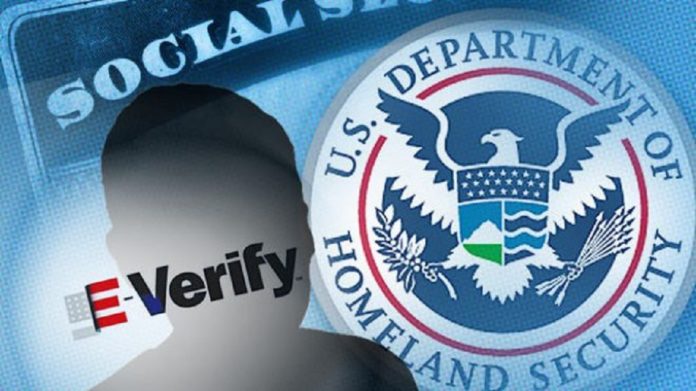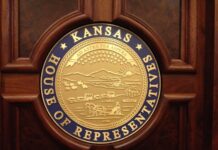If he’s elected governor, Republican Kris Kobach said Thursday night he would sign an executive order requiring state agencies to use a federal database confirming whether their employees and contractors can legally work in the United States.
Speaking to the Sunflower Republican Club in Olathe, Kobach said he wants to force state agencies to use the Internet-based system, E-Verify, to determine not only whether state employees are eligible to work here but contractors’ employees as well.
“If you want to build a road for Kansas, you want to build a building for Kansas, you want to put in vending machines for Kansas, you have to have legal U.S. workers,” the secretary of state said.
“The state is a big economic player in Kansas so if the state is saying you have to use E-Verify, then a lot of big Kansas companies will use E-Verify,” Kobach said.
Kobach’s comments come in the heat of a tough Republican primary that includes Gov. Jeff Colyer, Insurance Commissioner Ken Selzer and former state Sen. Jim Barnett.
A hard-liner on illegal immigration, Kobach has unsuccessfully fought for years to get Kansas to implement E-Verify along with a string of other measures intended to curb the flow of undocumented immigrants into the state.
Over the years, Kobach has gained headlines across the country in his battle against illegal immigration. He’s helped states and cities nationwide write laws aimed at cracking down on undocumented immigrants.
He helped write Arizona’s first-in-the-nation E-Verify law, which was upheld by the U.S. Supreme court after a legal challenge by the U.S. Chamber of Commerce. The Arizona E-Verify law applied to all employers not just state agencies.
Optimally, Kobach would like to see Kansas – like Arizona – require E-Verify for all businesses although he conceded that wouldn’t be easy. He said that will depend on the political makeup of the Legislature. “I will be pushing for that as well – as I always have.”
In the past, the Legislature has considered bills that would have required employers to use the federal database to qualify for state contracts totaling $5,000 or more. But those bills failed to get very far, especially in the face of opposition from the business community.
Federal law already requires businesses to verify that prospective employees are eligible to work in the United States by inspecting proof-of-citizenship documents such as a birth certificate. They’re not required to use E-Verify, however.
As of last year, 22 states had some variation of the E-Verify law in place, including nine that required it for all private employers, according to the Pew Charitable Trusts. The other states imposed the requirement for some public employers and government contractors.
Kobach dismisses any notion that an E-Verify requirement would hinder business growth. He called it “nonsense.”
“There are numerous states that make it mandatory,” Kobach said. “The last time I checked, Arizona and Georgia are doing quite well economically.”
















